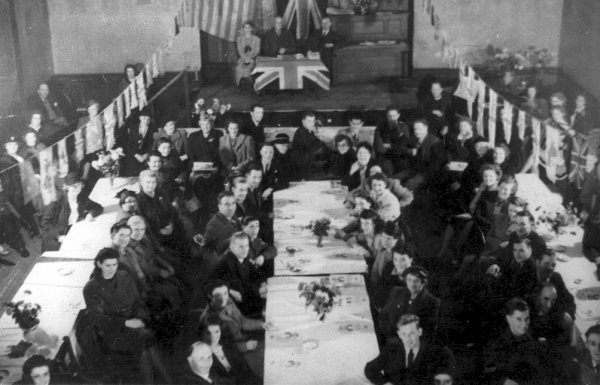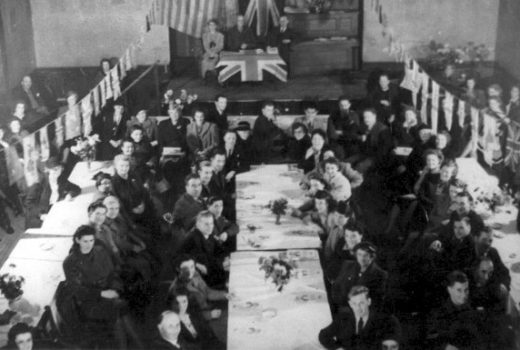Ian Brown
Such a victory as we have gained is a splendid moment both in our small lives and in our great history. It is a time not only of rejoicing but even more of resolve. When we look back on all the perils through which we have passed and at the mighty foes we have laid low and all the dark and deadly designs we have frustrated, why should we fear for our future? We have come safely through the worst.
Rt. Hon. Winston Churchill, Leader of the Opposition, 16 August 1945
These words, spoken on the day after Japan had announced its acceptance of unconditional surrender, succinctly summarized the optimism felt throughout East Lothian, and the rest of the United Kingdom, at the conclusion of the second world war. This euphoria was primarily due to the victory that had been achieved, after six long years of war. The joy and relief of winning the war meant that the sacrifices that people had, and were still, enduring, appeared not just necessary, but actually worthwhile, and thus people were able to rejoice despite the ongoing hardships.

Perhaps the second most significant factor in the national mood of optimism was the election of a Labour Government in July. Their victory led to high expectations of social justice: the ‘land fit for heroes’ that had been anticipated, but not delivered, at the end of the Great War. The publication in 1942 of the Beveridge Report led to demand for the implementation of a national insurance scheme which, by means of a flat-rate contribution, would ‘abolish want’. Part of this ‘cradle to grave’ provision would be a free National Health Service. The Education (Scotland) Act of 1945 consolidated the pre-war reforms of the education system, introducing free secondary schooling to the age of 15 for all. These were elements of a fundamental transformation of British society and were seen as a fair and just way to improve Britain for all its citizens.
Nationalisation was seen as the means by which the whole nation could reap the benefits of its industry, whilst improving safety records. The latter aspect was of particular concern to the coal mining industry, because the safety record at some pits was poor, due to lack of investment by pit owners. Under nationalisation, the vast majority of pits would soon come under the control of the National Coal Board, rather than being privately run, and safety would not come second to profits. Nationalisation was also seen as the best means of making companies accountable, since they would be responsible to elected officials.
The costs of the National Health Service, as its scope and bureaucracy spiraled ever greater, and the inefficiency of nationalised industries, all of which became apparent in the 1960s and 1970s, were unknown in 1945. Instead, the desire to end the huge gulf between rich and poor had led to the election of a Labour Government with a clear mandate for wide-ranging social and economic reforms. All levels of society had shared the hardships of war, and there was a very strong belief that everyone should reap the rewards and have a better standard of life as a result.
Rationing, although strict, was not as severe as it would soon become. In 1946, in response to the need to help feed the population of war-torn Germany, bread became rationed in Britain, a step not taken even in the darkest years of the war. It is the ultimate irony that despite winning the war, rationing became stricter in peacetime than it had been during wartime, and that this was in order to feed former enemies. However, in 1945 this had not yet happened and, in a predominantly agricultural area such as East Lothian, in general, food shortages were not too severe.
It took time to wind down the war economy, and in August 1945 industrial production was still more-or-less at full capacity. Certainly, the number of men working in East Lothian coalmines was rising and firms such as Brunton’s Wire Works, Musselburgh were continuing to meet military orders. On the land too, output was high with agricultural labour added to with Italian and German prisoners of war from the camps at Gosford and Amisfield. There was, of course, also the Women’s Land Army, which had not yet been disbanded and many young women continued to work from the hostels at Saltoun Hall, Skedsbush, Eaglescairnie and Quarry Court for some time after peace was declared. With peace came demobilisation, although for most service personnel it was, in August 1945, still many months away. However, unlike the Great War, few East Lothian men failed to return home from military service. Thus, wives and sweethearts welcomed peace and longed for the return of their loved ones, rather than being grief-stricken in the realisation that they would never return home.
Although East Lothian was in the front line from almost the first day of the war and was to witness numerous air attacks on the Firth of Forth, the county did not suffer bombing on the scale seen in many other places. Bombs were dropped on East Lothian, but there was no widespread devastation such as that seen on Clydeside in 1941. In fact, only four people died as a result of bombing attacks and, whilst tragic, it meant that the people of East Lothian could welcome peace without the grief of communities that had been destroyed by war.
Although many of the dreams of 1945 were to be dashed in the years to come, they were very much alive then. The people of East Lothian had, along with the rest of the country, much of which to be proud. There was every reason to celebrate the end of the war and to look forward to a better future. Churchill’s comments quoted above amply portray the mood of people at the moment of victory. However, although not obvious then, harder times were certainly to come and it was Prime Minister Winston Churchill’s speech on 8 May 1945 which summarised the realities of the future which the people of East Lothian and Britain faced in 1945: ‘We may allow ourselves a brief period of rejoicing, but let us not forget for a moment the toil and efforts that lie ahead.’
